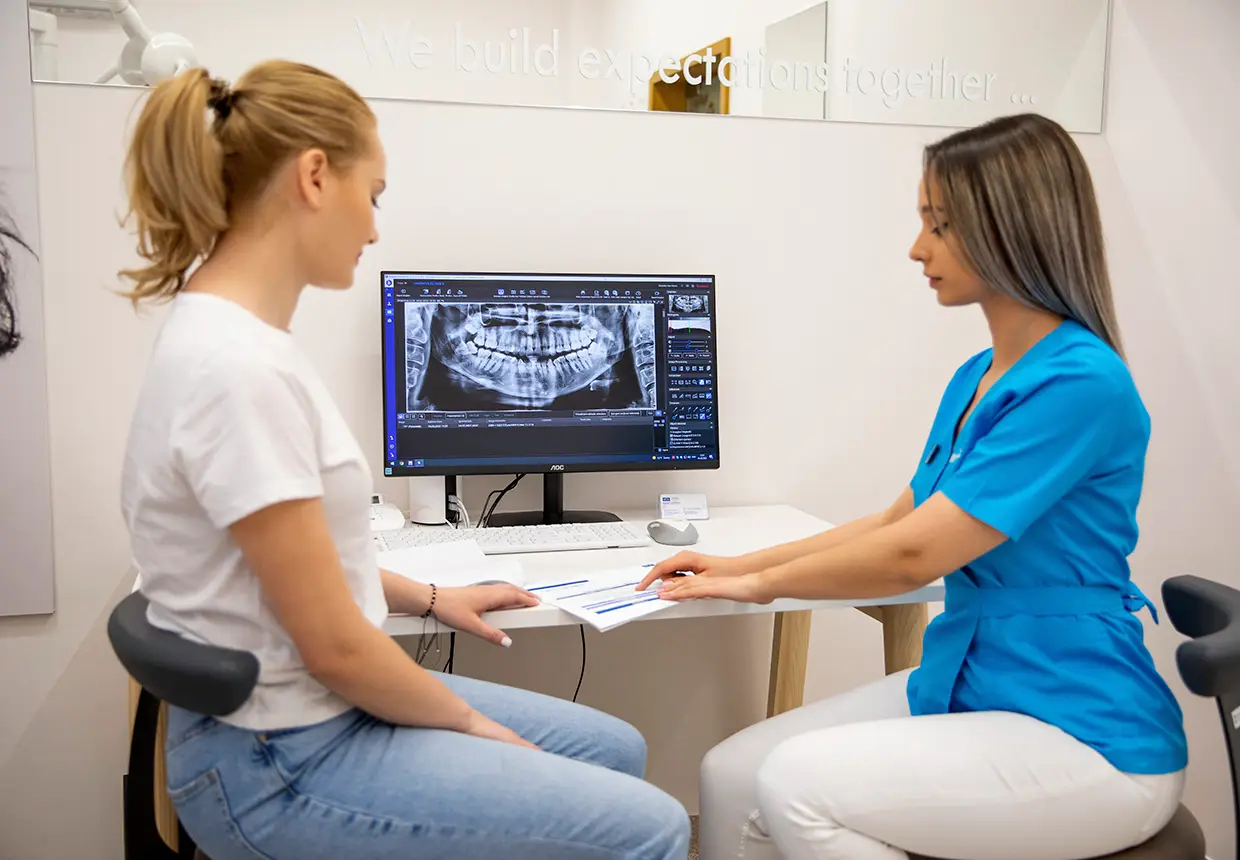
What is dental neuralgia?
Causes, symptoms, treatment
Dental neuralgia, also known as toothache, is a fairly common problem among the population. As the name suggests, dental neuralgia is the pain ("algia") of a nerve ("nevr") in a tooth. If you are dealing with dental neuralgia, here is what you need to know about its causes and how to manage the problem as effectively as possible.
Causes of dental neuralgia
Toothaches can have multiple causes, ranging from cavities to periodontitis and dental hypersensitivity. Here’s what you need to know about the main reasons dental neuralgia occurs:
- Cavities are among the most common causes of tooth pain, manifested by the localized destruction of enamel, then dentin, and finally reaching the nerve. The deeper the damage, the more intense the pain.
- Sharp pain on contact with cold or a sweet substance often indicates a cavity.
- Pulpitis is an inflammation of the tooth nerve. It can be reversible (when the inflammation is mild and the tooth pulp can be saved) or irreversible (when the dental pulp is severely affected and cannot be saved). Pain from this condition can be very intense and increase with exposure to cold, heat, or while lying down.
- Periodontitis generally causes more diffuse and radiating pain. In this case, the tooth is sensitive to mechanical pressure, such as during chewing. Periodontitis is associated with gum recession and bone resorption, which favors the deposition of food debris between teeth and the appearance of interproximal cavities.
- Post-extraction pain is inevitable and can usually be managed with painkillers prescribed by the dentist.
- Dental hypersensitivity occurs when the enamel, the outer layer of the tooth, deteriorates, exposing the dentin, which, due to its tubular structure, allows stimuli to reach the nerve. This hypersensitivity can also occur when consuming large amounts of acidic and sweet products, such as carbonated drinks, which lead to tooth demineralization.
- An abscess is a bacterial infection caused by the gangrene of the dental pulp associated with the appearance of apical periodontitis. The abscess can be accompanied by fever and can spread to the tissues surrounding the tooth. It is important to treat a dental abscess in time because it can be located near teeth with important anatomical structures and formations, such as the maxillary sinuses and the brain.
- Wisdom teeth eruption usually occurs between the ages of 18 and 25 but can also happen later, or in some people, never. The eruption of these molars can cause pain and cavities in neighboring teeth if positioned incorrectly, and sometimes can lead to infections.
- Gingivitis or gum inflammation can result from insufficient brushing, leading to swelling and bleeding of the gums. Effective brushing and antiseptic mouthwashes can help reduce pain while awaiting a possible scaling by the dentist. Untreated gingivitis can progress to periodontal disease.
- Stress can also impact physical health. During highly stressful periods, some people tend to clench their jaws very tightly, leading to dental neuralgia and joint pain. Others suffer from bruxism, grinding their teeth during sleep, causing their deterioration and creating more sensitive areas to stimuli. In such cases, the cause needs to be treated. Consulting a psychologist, who may prescribe anxiolytics, and using various relaxation techniques, meditation, and breathing exercises, can help.
- Sinusitis is the inflammation of the sinus mucosa, associated with mucus accumulation inside the sinuses. It can occur following a cold or untreated dental issues. The pressure inside the sinuses can cause headaches and tooth pain. Treating sinusitis usually leads to the disappearance of tooth pain.
Types of dental neuralgias
There are several types of neuralgias depending on their location and cause:
Essential dental neuralgia
This type of pain does not have a clear location, is intermittent, short-lasting, with a sudden onset and end. It does not have a known cause.
Secondary dental neuralgia
This type has a locatable, identifiable cause. The pain can be persistent, long-lasting, and may send the patient to the emergency room.
Trigeminal neuralgia
Trigeminal neuralgia, also known as tic douloureux, is a sharp, stabbing, or electric shock-like pain felt in the jaw, maxilla, around the nose, and above the eye. It is caused by irritation of the trigeminal nerve and can be triggered by simple actions such as brushing teeth, shaving, eating, or a gust of wind. Initially, the episodes can be short, but unmanaged trigeminal neuralgia can gradually worsen.
This condition cannot be cured, but available treatments, including anticonvulsants, are prescribed by a doctor. Surgical intervention on the affected area is also possible. There are two types of trigeminal neuralgia: primary and secondary. The primary, essential, or idiopathic type has no obvious cause of trigeminal nerve compression. The secondary type can be caused by pressure from a tumor, cyst, facial injuries, dental conditions, etc.
Trigeminal neuralgia affects women more than men and is more common in people over the age of 50.
Symptoms of dental neuralgia
The main manifestation of dental neuralgia is, as the name suggests, severe pain, which can be acute or throbbing. This pain starts at the level of the affected tooth and moves to the surrounding tissues, potentially radiating to the rest of the head. Tooth pain is sudden and can occur when the affected tooth comes into contact with cold, heat, sweets, during chewing, or even when the patient talks. The pain can be violent and throbbing, like an electric shock or a needle prick.

In addition to pain, the symptoms of dental problems include:
- Bleeding;
- Fever;
- Inflammation;
- Lesions in the infected area;
- Difficulty swallowing;
- Bad breath.
Regardless of the associated symptoms, dental neuralgia is a sign that you should make an appointment with your dentist.
Predispositions and risk factors for the occurrence of dental neuralgia
Dental neuralgia is often a symptom of a dental condition. Therefore, risk factors include:
- A diet high in sugary or acidic foods;
- Smoking;
- Alcohol consumption;
- Poor oral hygiene;
- Lack of regular dental check-ups;
- Cavities and other dental conditions.
It is recommended to visit your dentist at the first sign of pain to prevent the condition from worsening. Some complications of dental conditions can be severe. For example, if an abscess is left untreated, the infection can spread throughout the body and cause endocarditis/myocarditis or septicemia.
Treatment for dental neuralgia
There are numerous treatments for toothache, depending on its causes. Initially, the dentist will determine the causes and, based on these, will create a treatment plan while also reducing the pain by prescribing anesthetic mouthwashes, anti-inflammatory drugs, and/or antibiotics. Thus:
- If it is a simple cavity, the dentist will clean the area and fill it.
- If it involves a tooth/molar that needs to be extracted, the dentist will perform the extraction and then replace it.
- In the case of an abscess or periodontitis, the dentist will institute the appropriate treatment specific to either condition. If not treated promptly, it can lead to serious complications.
Regarding medication treatment, the dental specialist may prescribe analgesics (nonsteroidal anti-inflammatory drugs). Ibuprofen and paracetamol are among the anti-inflammatory medications for teeth. Antibiotics may also be necessary if dental neuralgia is caused by a bacterial infection. In this case, a doctor's advice and prescription are required. Additionally, certain antiseptic mouthwashes sold over the counter in pharmacies can be used.
Natural remedies for dental neuralgia
There are numerous natural methods to manage dental neuralgia. However, prevention, including at least an annual visit to the dentist, remains the best way to limit the occurrence of dental pain. Proper brushing and the use of interdental brushes or floss can clear a blocked area of food debris, calming the pain. While waiting for your dental appointment, here are some temporary remedies you can use:
- Chamomile, in the form of tea or granules, has pain-relieving properties.
- Cloves contain a high level of eugenol, a substance that is anti-inflammatory, antibacterial, and analgesic. You can crush a clove and apply it to the painful cavity when needed. Alternatively, you can use clove essential oil by placing a few drops on a cotton pad and applying it to the painful area.
- Garlic has anti-infective, anti-inflammatory, and anesthetic properties and can be used as a compress.
- Clay is antiseptic, anti-inflammatory, and healing, and can be applied as a poultice to the painful area.
- Ginger is analgesic and can be used in powdered form mixed with water.
- Vinegar activates blood circulation and acts on the mucous membranes of the mouth. It can be used as a mouthwash.
- Sage essential oil is useful for oral inflammations and wound healing. It can be used mixed with a vegetable oil and applied to mouth ulcers.
- Aloe vera has anti-inflammatory properties. Applied as a gel, it is useful against inflammations and gum bleeding.
- Saltwater - a teaspoon of salt in a glass of water - can be used to rinse the mouth, removing food debris collected in various areas that can cause pain.
- An ice pack, wrapped in a towel and applied to the cheek, can reduce swelling after a tooth extraction.
Recommendations for patients suffering from dental neuralgia
It is important to remember that dental neuralgia is a symptom of various conditions, and its causes can only be determined by a specialist, ranging from a dentist to a neurologist. The occurrence of tooth pain can be prevented with impeccable oral hygiene, limiting the consumption of sugar, alcohol, acidic foods, and through annual dental cleanings performed at the dental office.
- If you suffer from tooth pain, try to make an appointment with your dentist as soon as possible. In the meantime, you can try to reduce the pain using the following methods:
- Brush your teeth several times a day with a medium-hard toothbrush with bristles of uneven heights.
- Use an antiseptic mouthwash, as recommended by your dentist, without overdoing it.
- Use painkillers prescribed by your doctor if you managed to speak with them over the phone. It is not advisable to take toothache or dental pain pills for more than 48 hours without consulting a doctor.
- Use natural remedies from those presented above.
- Manage dental sensitivity by using specific products recommended by a specialist, such as toothpaste, mouthwash, and by treating bruxism (teeth grinding).
Tooth pain or dental neuralgia, even though it is a fairly common discomfort, should not be ignored. It can be a symptom of more or less serious conditions, so do not hesitate to consult your dentist, who will provide you with a treatment plan and the best advice.
Bibliography
- https://www.nhs.uk/conditions/trigeminal-neuralgia/diagnosis/
- https://www.aans.org/Patients/Neurosurgical-Conditions-and-Treatments/Trigeminal-Neuralgia
- https://www.cduma.com/blog/tooth-pain-it-could-be-trigeminal-neuralgia
- https://www.mayoclinic.org/diseases-conditions/trigeminal-neuralgia/symptoms-causes/syc-20353344


